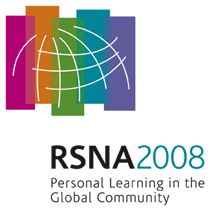
Abstract Archives of the RSNA, 2008
Wendie A. Berg MD, PhD, Presenter: Consultant, Naviscan PET Systems, Inc
Advisory Board, Naviscan PET Systems, Inc
Equipment support, Siemens AG
Travel support, General Electric Company
Jeffrey D. Blume PhD, Abstract Co-Author: Nothing to Disclose
Amanda Adams MPH, Abstract Co-Author: Nothing to Disclose
Roberta A. Jong MD, Abstract Co-Author: Researcher, General Electric Company
Richard Gary Barr MD, PhD, Abstract Co-Author: Consultant, Siemens AG
Consultant, Koninklijke Philips Electronics NV
Research grant, Siemens AG
Daniel E. Lehrer MD, Abstract Co-Author: Nothing to Disclose
Etta D. Pisano MD, Abstract Co-Author: Institutional research agreement, General Electric Company
W. Phil Evans MD, Abstract Co-Author: Scientific Advisory Board, Hologic, Inc
Mary C. Mahoney MD, Abstract Co-Author: Speakers Bureau, Johnson & Johnson, Cincinnati, OH
Consultant, SenoRx, Inc
Linda Jean Hovanessian Larsen MD, Abstract Co-Author: Nothing to Disclose
Glenna Gabrielli BS, Abstract Co-Author: Nothing to Disclose
Ellen Bachman Mendelson MD, Abstract Co-Author: Advisory Board, The Medipattern Corporation, Toronto, ON, Canada
Scientific Advisory Board, Siemens AG
Equipment support, Koninklijke Philips Electronics NV
et al, Abstract Co-Author: Nothing to Disclose
To determine reasons for nonparticipation in a trial of supplemental screening with magnetic resonance imaging (MRI) after mammography (M) and ultrasound (US).
In the original ACRIN 6666 protocol of supplemental screening US in women at elevated risk of breast cancer, 2809 participants were enrolled. 14/21 institutions met technical and experience requirements for an IRB-approved substudy of a single contrast-enhanced screening MRI within 8 weeks of completing the 24 month M+US screen. 1318 participants in the original protocol were considered for MRI and analyzable. Reasons for nonparticipation were collected, and demographics of those participating were compared to those not participating.
701 Women enrolled in the MR substudy. 617 did not or could not: 134 (21.7%) not eligible by protocol (due to recent breast surgery, biopsy, metastatic disease, other) and 10 (1.6%) unable to be contacted. Of 473 eligible, analyzable nonparticipants, 87 (18.4%) refused due to claustrophobia; 79 (16.7%) time constraints; 60 (12.7%) financial concerns (though ACRIN would fund if insurance would not); 49 (10.4%) medical inability to tolerate MRI; 47 (9.9%) patient or physician doesn’t feel MRI is indicated; 35 (7.4%) not interested; 27 (5.7%) didn’t want i.v. injection; 26 (5.5%) were concerned about extra biopsies or testing that might result; 23 (4.9%) precluded by MRI scheduling/availability; for 8 (1.7%), distance or travel to the site were problematic; and 7 (1.5%) concerned about gadolinium/NSF/allergic reaction. 25 (5.3%) Participants reported other reasons that could not be categorized into the above.
The mean age of participants was 54.8 years (range 25-85, SD 9.5). Participants were slightly more likely to be Caucasian (OR 1.98, 95% CI 1.14, 3.45). There were no other differences in race, ethnicity, insurance status, risk factor eligibility, menopausal status, prior imaging history, hormone use, or bra cup size, between participants and either nonparticipants or the overall ACRIN 6666 study population.
Of 1174 women at elevated risk of breast cancer who could, by protocol, have a breast MRI at no cost, only 701 (59.7%) agreed to participate.
Our results help inform policies recommending screening breast MRI in women at increased risk of breast cancer. Alternative screening strategies may be needed for a large group of such women.
Berg, W,
Blume, J,
Adams, A,
Jong, R,
Barr, R,
Lehrer, D,
Pisano, E,
Evans, W,
Mahoney, M,
Hovanessian Larsen, L,
Gabrielli, G,
Mendelson, E,
et al, ,
Reasons for Refusing a Screening Breast MRI in Women at Elevated Risk of Breast Cancer: ACRIN 6666 (American College of Radiology Imaging Network). Radiological Society of North America 2008 Scientific Assembly and Annual Meeting, February 18 - February 20, 2008 ,Chicago IL.
http://archive.rsna.org/2008/6012879.html

